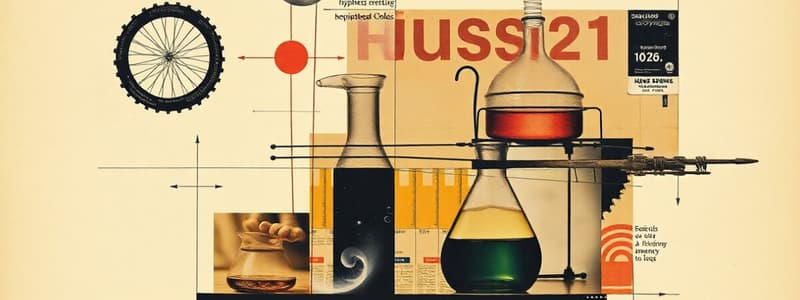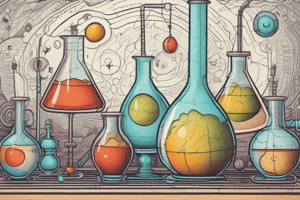Podcast
Questions and Answers
What is the first step of the Scientific Method?
What is the first step of the Scientific Method?
- Experiment
- Observation (correct)
- Conclusion
- Hypothesis
What is a hypothesis?
What is a hypothesis?
- A question that needs to be answered
- A summary of results
- A guess based on prior knowledge
- A testable prediction (correct)
Which of the following is an example of a controlled variable in an experiment?
Which of the following is an example of a controlled variable in an experiment?
- The sunlight exposure for each plant
- The height of the plants measured
- The amount of water given to each plant (correct)
- The type of plant used in an experiment
What do scientists do during the 'experiment' step?
What do scientists do during the 'experiment' step?
After conducting an experiment, what is the next step in the Scientific Method?
After conducting an experiment, what is the next step in the Scientific Method?
Why is it important to repeat experiments?
Why is it important to repeat experiments?
What is the purpose of the conclusion in the Scientific Method?
What is the purpose of the conclusion in the Scientific Method?
If a scientist's hypothesis is not supported by the experiment, what should they do next?
If a scientist's hypothesis is not supported by the experiment, what should they do next?
What is an independent variable in an experiment?
What is an independent variable in an experiment?
What is the significance of peer review in scientific research?
What is the significance of peer review in scientific research?
Flashcards are hidden until you start studying
Study Notes
The Scientific Method
- The first step in the Scientific Method is observation.
- A hypothesis is a testable prediction based on prior knowledge.
- A controlled variable is a factor that remains constant throughout an experiment.
- The experiment step involves testing the hypothesis.
- After an experiment, scientists draw conclusions based on the data.
- It is important to repeat experiments to ensure accuracy and reliability of results.
- The conclusion summarizes the experiment, shares results, and determines whether the hypothesis was supported.
- If a hypothesis is not supported, scientists should revise the hypothesis and test again.
- The independent variable is the factor that is changed or manipulated in an experiment.
- Peer review helps validate research and improve its quality by having other scientists examine the work.
Open-Ended Questions
- When investigating the effect of temperature on sugar dissolving, the hypothesis could be "Higher temperatures will cause sugar to dissolve faster."
- The experiment design could involve using different temperatures of water with the same amount of sugar.
- Results could be analyzed by measuring how long it takes for the sugar to dissolve at each temperature.
- Peer review is important because it allows for the evaluation of scientific work by experts in the field.
- This helps ensure the accuracy, validity, and rigor of scientific research.
- An example of peer review could be how a research paper goes through a review process by other scientists before being published in an academic journal.
Studying That Suits You
Use AI to generate personalized quizzes and flashcards to suit your learning preferences.





